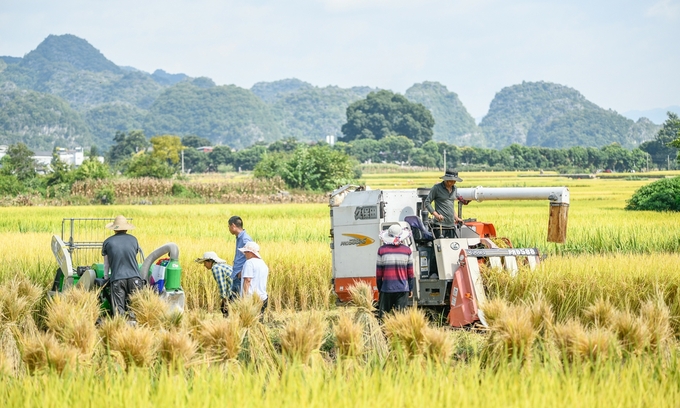November 26, 2025 | 20:44 GMT +7
November 26, 2025 | 20:44 GMT +7
Hotline: 0913.378.918
November 26, 2025 | 20:44 GMT +7
Hotline: 0913.378.918

Farmers harvest paddy rice in Xingyi, Southwest China's Guizhou Province on August 30, 2022. Photo: VCG
Ye Xingqing, a senior expert at the rural economy center of the Development Research Center of the State Council, made the remarks at an international forum discussing the development and investment of grain supply chains during the 2022 China International Fair for Trade in Services.
Over the past decade, China's grain production has been climbing while grain imports have also been increasing. In 2021, the country produced 680 million tons of grain, an increase of 70 million tons from 10 years ago. Meanwhile, its grain imports also reached 164.54 million tons last year, including 90 million tons of soybeans, according to media reports.
Ye noted that moderate imports are important to ensure China's food security due to the increasing volatility of global food prices as well as some countries' restrictions on food exports.
"Some foreign media outlets may make something out of China's grain imports, alleging that the country's grain stocks have pushed up international food prices," Ye said, noting that China's imports do not steal others' rice bowls.
China's soybean imports, for example, have continued to grow for more than 20 years, while the global share has reached 60 percent. However, imports from other countries are also growing. "China's soybean trade is characterized by typical incremental trade, indicating that the country is not crowding out other countries' market shares or threatening others' imports," according to Ye.
Since June last year, food prices have risen by more than 15 percent in 51 countries, and are expected to remain high by 2023, Alex Marianelli, Director of Supply Chain for the United Nations World Food Programme, said during the forum. Alex noted that the reasons for soaring food prices include the rising cost of cultivation, export restrictions in some countries as well as reduced food production due to extreme weather.
"Saying that China steals others' rice bowls is simply nonsense," Jiao Shanwei, editor-in-chief of industry news website cngrain.com, told the Global Times on Sunday that after the food shortage of 2008 and 2012, the importance of food security has become a consensus of all countries worldwide.
China has a large population and food security has always been a top priority, so the country's domestic food stocks have been relatively adequate, which is in line with national conditions and population structure, as well as economic development needs, Jiao noted.
Ye said that China's grain stocks and its high global share are the result of imports overlaid during the global food price downturn in the past few years as well as the nation's growing domestic grain production.
"In the last two years, China's stocks of major grain varieties and global share have been declining, which is the country's contribution to maintaining global food security by releasing stocks to ease the pressure on global food supply," Ye noted.
In terms of the hot climate that countries worldwide are facing this summer, Alex said that droughts in some grain-exporting countries could also lead to decline in grain production, which may further push up global food prices.
China also underwent droughts in the south including Southwest China's Sichuan Province due to continuous heat waves.
"The natural disasters will have little impact on China's autumn grain harvest or the country's food imports despite potential output reduction of some dryland crops," Jiao said, as the country is fully able to achieve 100 percent self-sufficiency in wheat and rice.
(Global Times)

(VAN) A new study reveals how the simultaneous effects of ocean acidification, salinity and loss of oxygen are making the world more fragile.

(VAN) Hopes are growing that the creation of the first 3D turkey gut model could be a turning point in the battle against the virulent blackhead disease.

(VAN) Tyson, America’s biggest meat supplier, plans to shutter one of its largest beef processing plants as the industry continues to struggle with low cattle supplies and political pressure from Washington.

(VAN) New FAO study shows how digital solutions are empowering farmers and fishers to prevent losses and build resilient agrifood systems.

(VAN) Brazil's COP30 presidency pushed through a compromise climate deal on Saturday that would boost finance for poor nations coping with global warming but that omitted any mention of the fossil fuels driving it.

(VAN) Poultry farmers in the UK have been warned that they could face one of the worst winters yet for bird flu.

(VAN) Prices of main-crop paddy have risen sharply, with jasmine rice hitting 16,100 baht per tonne — the highest level in years.